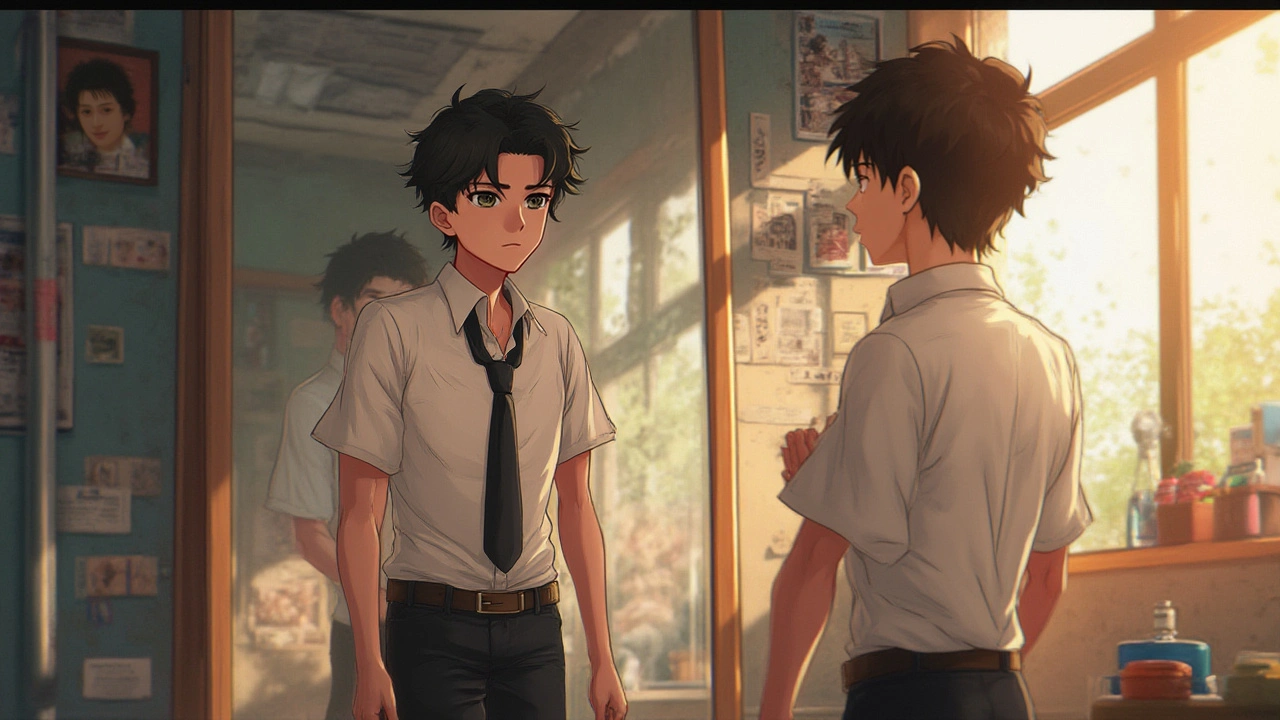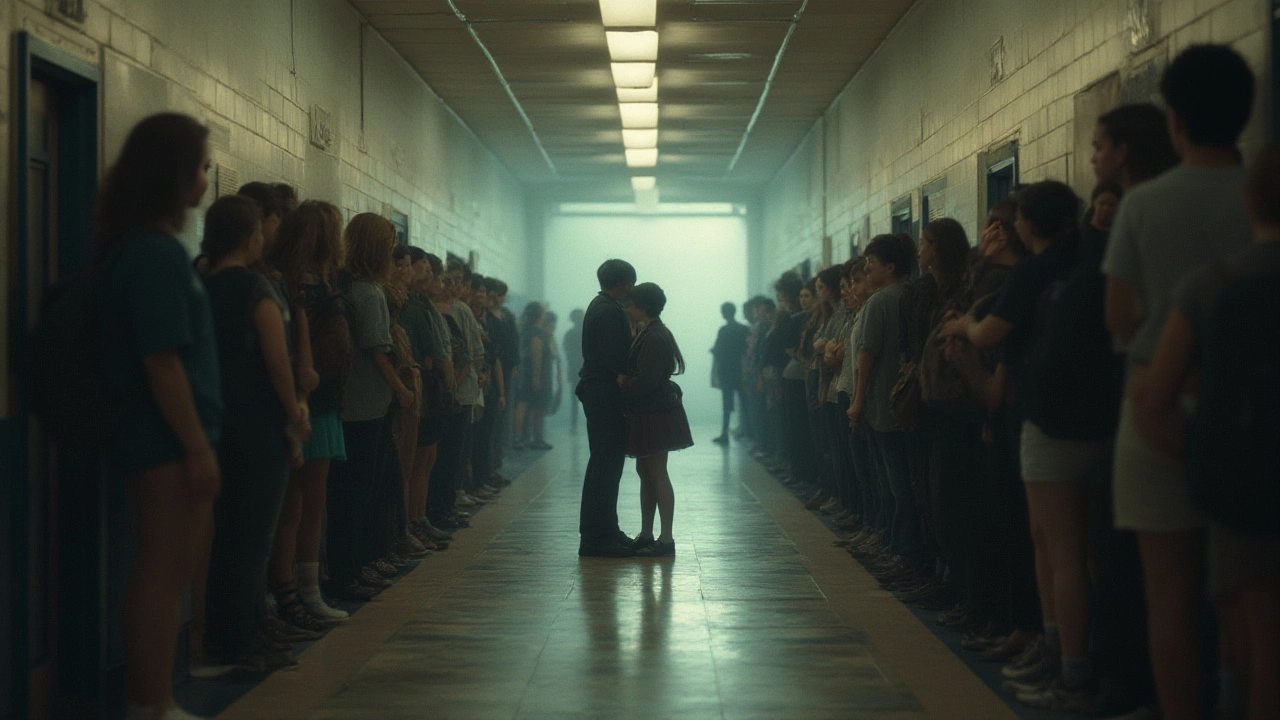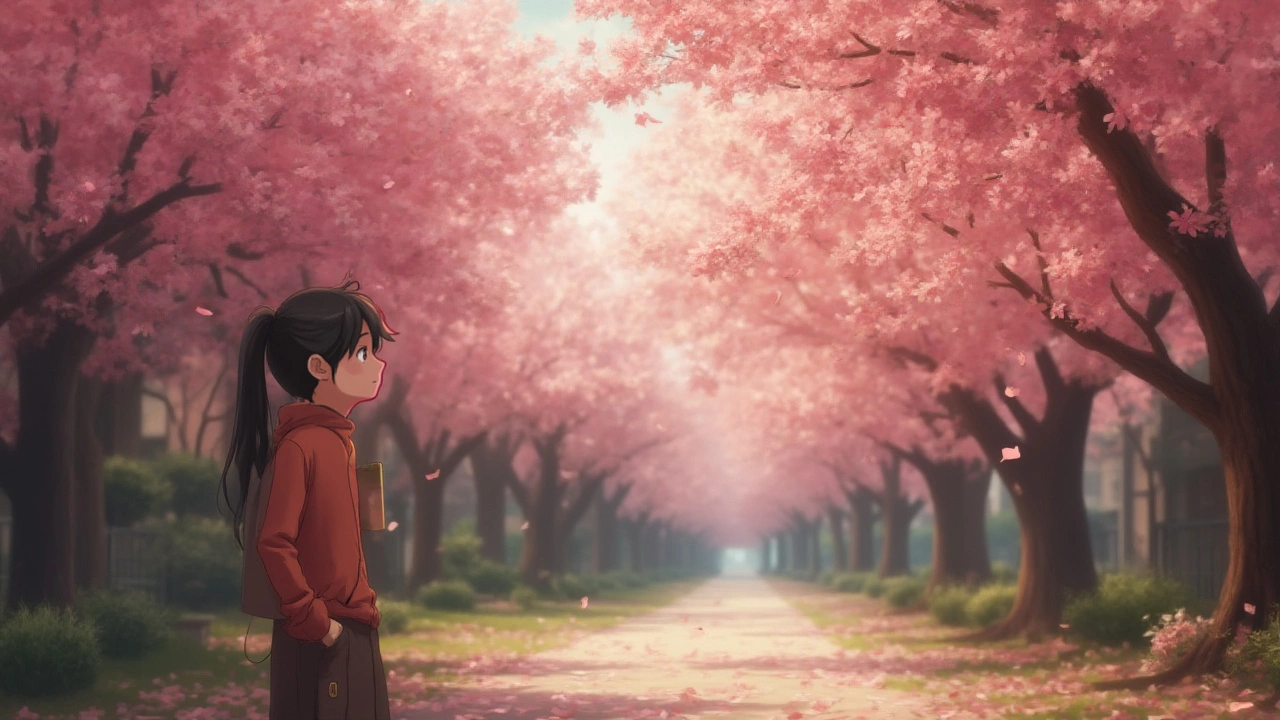Masamune-kun's Revenge: From Vengeance to Real Romance

Imagine spending years training, leveling up your looks and your mind, all to pull off the ultimate payback. That’s Masamune Makabe’s life: once a chubby kid bullied by Aki Adagaki, he works himself to the bone for one goal—make her fall in love, then break her heart. Sounds simple, right? But nothing in this story is that straightforward, and that’s what keeps fans hooked.
There’s a big twist in the tale. Turns out, the real mastermind behind Masamune’s old nickname wasn’t even Aki. It was Yoshino Koiwai, Aki’s so-called loyal friend. This bombshell flips Masamune’s world. Suddenly, all that anger feels pointless. What happens when revenge no longer makes sense? The show dives right into that emotional mess, pushing both Masamune and Aki into unfamiliar, honest territory.
- The Plot Twist That Changes Everything
- Main Characters and Their Real Struggles
- Digging Deeper: Themes of Identity and Class
- Anime vs Manga: What’s Different?
- Why It Stands Out & Tips for New Viewers
The Plot Twist That Changes Everything
The whole setup of Masamune-kun's Revenge seems simple: get even with the rich girl who wrecked your childhood confidence. But here’s the kicker—just when you think you know where the story is headed, the truth comes out and turns everything upside down. That so-called ‘villain,’ Aki Adagaki, wasn’t actually behind Masamune’s childhood humiliation. Instead, it was her attendant, Yoshino Koiwai, who set the betrayal in motion back when they were all kids.
This twist hits late in the series, right at the end of the anime’s second season (2023), and it changes the whole vibe. All of those calculated moves and fiendish plans? Suddenly, they feel kind of pointless, and you see Masamune—and honestly, everyone else—in a brand-new light. The series doesn’t just treat this like a throwaway shock either. It leans into the fallout. Masamune has to rethink every decision he’s made and finally gets honest with himself and Aki.
This fresh take breaks a pile of anime tropes. Most stories keep the grudge until the very end. Here, Masamune’s motivation drops out from under him before the finale, forcing him to deal with his real feelings. The switch isn’t just for show—it sparks some much-needed growth and awkward but honest romance. Not many romantic comedies dare to rewrite the entire purpose of their hero halfway through.
For anyone curious, here’s a quick breakdown of who did what:
| Character | Role in the Twist |
|---|---|
| Masamune Makabe | Believed he was getting revenge for a personal betrayal |
| Aki Adagaki | Was the supposed culprit, but actually innocent |
| Yoshino Koiwai | The real mastermind behind Masamune's childhood nickname |
This reveal doesn’t feel cheap—it makes rewatching the first season way more interesting. You start picking up on hints you missed before, and Aki’s actions suddenly make a lot more sense. Plus, it sets the scene for the show’s real focus: moving from old grudges to finding what (and who) really matters now. If you’re into stories that pull the rug out and force everyone to grow up fast, this twist makes the whole series worth checking out.
Main Characters and Their Real Struggles
The driving force of Masamune-kun's Revenge is how the characters deal with their hang-ups and mistakes—not just the comedy or the romantic tension. Let’s break down what actually makes them tick.
Masamune Makabe isn’t your typical confident anime lead. Sure, he’s stylish and smart now, but it’s all armor. Underneath, he’s got this deep insecurity from being bullied as a kid. Even when he’s trying to pull off his revenge plot, you see flashes of his old self: the worry, the self-doubt, and the fear of never being good enough. His struggle is about letting go of past hurt and figuring out who he is, now that he’s finally changed on the outside.
Aki Adagaki is more complicated than her nickname, the “Cruel Princess,” lets on. On the surface, she’s cold and proud, always acting above everyone else. But she’s lonely, and those walls are up for a reason. She became hard after being let down by people close to her. Her big challenge? Learning to trust again, to actually let herself care—and admit her mistakes.
Yoshino Koiwai is maybe the biggest curveball. She seems like a sidekick at first, loyal to Aki and always in the background. But when the truth spills out that she was the real reason for Masamune’s humiliation as a kid, everything changes. Her struggle is with guilt. She works behind the scenes, trying to push the others together or apart, but it’s all because she wants to fix what she broke years ago.
| Character | Main Struggle |
|---|---|
| Masamune Makabe | Self-image, moving beyond revenge |
| Aki Adagaki | Trust issues, emotional honesty |
| Yoshino Koiwai | Guilt, responsibility for her actions |
We’re not the only ones noticing this shift from shallow grudges to actual personal growth. As anime site Anime News Network put it:
"Masamune-kun's Revenge stands out for turning a petty plot into a surprisingly honest look at insecurity, pride, and second chances."
Watching them mess up, confront painful memories, and actually grow turns a silly premise into something pretty real. It’s not about the plot twist, but about watching these messed-up teens figure out something real about themselves—sometimes taking two steps forward, and one embarrassing step back.

Digging Deeper: Themes of Identity and Class
This part of Masamune-kun's Revenge isn’t just about payback or high school romance. The whole thing pokes hard at how people see themselves and how much money or family background clouds relationships. Masamune’s whole story kicks off because he’s not happy with who he was. He wasn’t just called names—he actually believed those insults. That belief lights a fire in him to change, but the change runs deeper than eating less and jogging more. It’s about wanting to rewrite his worth, both to himself and to others.
When Masamune walks into the elite school, he’s not just facing Aki. He enters a world built around status—the rich kids have it easy, everyone knows their place, and money matters. Aki comes from a loaded family, putting her at the top of the social food chain. Masamune, on the other hand, comes from a regular background, and it shows when he tries to keep up with the high-class crowd. The series shows all kinds of awkward moments—fancy parties, formal greetings, and the way parents talk about their kids’ futures. It’s clear the characters aren’t just fighting personal battles but also wrestling with where they fit in society.
Yoshino’s role also ties into class and identity. She works as Aki’s attendant, technically in a lower position, but her actions shape the whole plot. The series uses her character to show that money or rank doesn’t make you less smart or less influential. Yoshino turns out to be the real force behind a lot of what happened, which flips the expected order of things on its head.
Here's a quick look at how social class impacts the main characters:
| Character | Family Background | Impact on Story |
|---|---|---|
| Masamune | Middle-class | Feels out of place, drives transformation |
| Aki | Wealthy, prestigious | Controls social situations, sets high expectations |
| Yoshino | Servant class | Influences events from 'behind the scenes' |
If you just look at the show on the surface, you might think it’s a basic love story. But every major decision is packed with questions about fitting in, being seen, and what people will do to feel respected. For anyone watching, it’s useful to notice how “identity” isn’t always about who you are, but who people expect you to be—and how hard it is to break out of those boxes.
Anime vs Manga: What’s Different?
If you’re thinking about diving into Masamune-kun's Revenge, you’ll notice some real differences between the anime series and the manga. Both deliver the bones of the story, but they don’t tell it quite the same way.
The manga, written by Hazuki Takeoka and illustrated by Tiv, ran from 2012 to 2018 and packs a lot into its ten volumes. The anime, however, was split into two seasons—one in 2017 and the second, called "Revenge R," in 2023. While the anime tried to hit all the main points, it trimmed or sped up several storylines. This is typical for anime adaptations, but it also means some subtler character moments or side stories get sidelined—or dropped entirely.
If you love details, the manga is where you’ll find more internal monologue, showing Masamune’s doubts and changing heart in full. There are also extra comedic bits and extra depth to Yoshino and Aki that the anime skips for time. Those little scenes often explain why characters do what they do, so missing them can make anime-only viewers scratch their heads.
The anime brings its own perks, though. Watching the story play out with full voice acting and a bright color palette makes the drama, and especially the comedy, pop. Aki’s over-the-top reactions hit way harder when you can actually hear them. Plus, the opening and ending songs are catchy as anything (if you’re anything like me, you’ll get them stuck in your head).
Here’s a quick breakdown of how the two versions line up:
| Aspect | Manga | Anime |
|---|---|---|
| Total Volumes/Episodes | 10 Volumes | 24 Episodes (12 per season) |
| Story Completeness | Complete story, all arcs included | Some arcs shortened, minor ones skipped |
| Character Development | Deep internal thoughts, more backstory | More visual, less detail on motives |
| Comedic Side Stories | Extra chapters, manga-only gags | Trimmed for pacing |
| Ending | Full closure, slow build to romance | Faster, more streamlined resolution |
If you’re just curious to see the revenge plot play out, the anime does the job fast and looks good doing it. But if you want to soak up every awkward moment and emotional twist, the manga has a lot more to give.

Why It Stands Out & Tips for New Viewers
This story doesn’t just stick to the usual high school romance playbook. Masamune-kun's Revenge stands out because it messes with your expectations from the first episode to the last. You think you’re signing up for a cheesy plot about getting even, but by the end you end up caring about actual growth, facing your past, and figuring out what love even means.
One big reason fans keep coming back is the twist that changes everything: the real culprit for Masamune’s pain isn’t Aki, but Yoshino. This isn’t just drama for the sake of it; it forces all the characters to grow in ways you don’t see coming. The series isn’t afraid to show how complicated emotions get when your goals suddenly vanish overnight.
If you like shows that balance humor and real emotion, you’re in for a treat. Here are some facts and tips to make your viewing smoother:
- The first season (2017) has 12 episodes, and the second season (2023) wraps up the main story.
- The anime skips some manga character backstories, but the main plot twist stays true to the original.
- Masamune and Aki’s relationship actually feels awkward at times, but that’s the point—they’re both working through baggage instead of acting perfect.
- If slow-burn romantic comedies are your thing, or if you like stories where characters get called out on their B.S., give this one a shot.
- Try not to binge it all in one go! The story hits harder if you let each episode sink in before moving on.
And just to show you how the story’s been received, here’s a little snapshot:
| Season | Year | IMDb Score | Episodes |
|---|---|---|---|
| 1 | 2017 | 6.7/10 | 12 |
| 2 (R) | 2023 | 7.1/10 | 12 |
Bottom line: this anime digs into the messiness of growing up and moving on in a way that’s both real and surprisingly funny. Whether you’re new to romance anime or you’re looking for something that’ll catch you off guard, Masamune-kun’s Revenge delivers more than it promises.
Dominic Fuchs
July 11, 2025 AT 00:56Kenneth Lewis
July 11, 2025 AT 17:03Leigh Guerra-Paz
July 12, 2025 AT 03:51Jerrod Davis
July 13, 2025 AT 17:24Jasper Arboladura
July 14, 2025 AT 03:00Joanne Beriña
July 15, 2025 AT 12:20ABHISHEK NAHARIA
July 17, 2025 AT 07:33shelly roche
July 18, 2025 AT 01:00Tionne Myles-Smith
July 19, 2025 AT 10:57Kelsey Worth
July 19, 2025 AT 13:12Emily Nesbit
July 20, 2025 AT 03:37Richard Elias
July 21, 2025 AT 17:35Jim Daly
July 21, 2025 AT 21:16Benedict Dy
July 23, 2025 AT 05:44Casey Nicole
July 23, 2025 AT 06:29Emily Rose
July 23, 2025 AT 15:22Hardik Malhan
July 24, 2025 AT 12:11Nirmal Jaysval
July 25, 2025 AT 13:01Asbury (Ash) Taylor
July 26, 2025 AT 10:05Jordyn Holland
July 27, 2025 AT 11:17